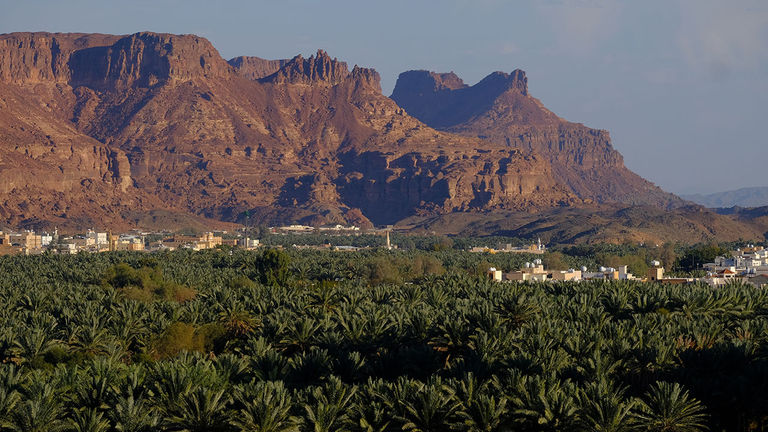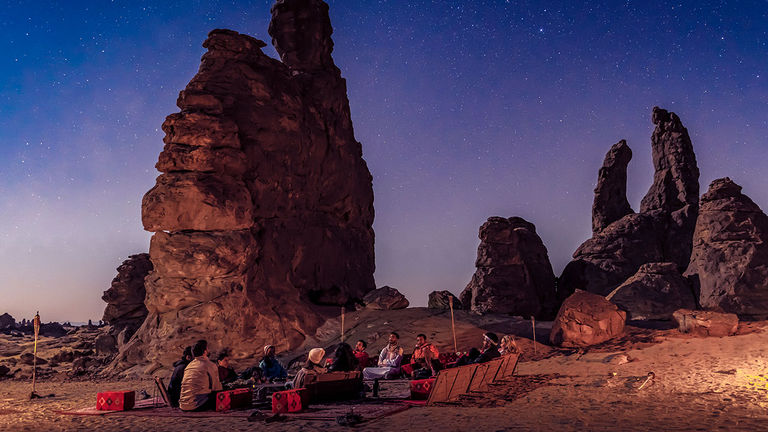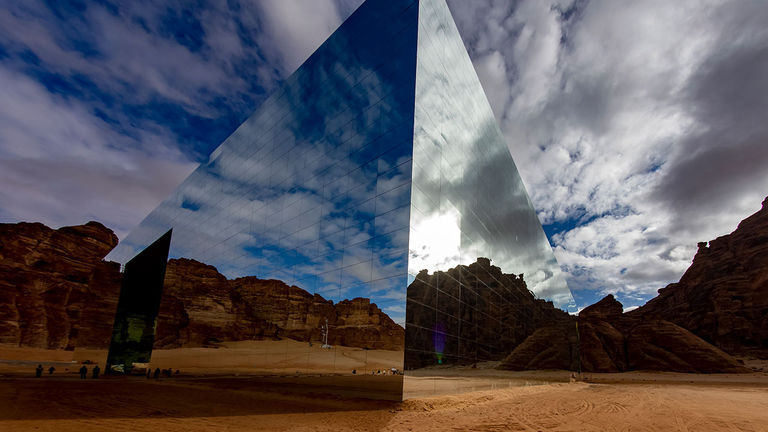It’s not often that an entirely new tourism destination is born — but that’s exactly what’s happening now in Saudi Arabia, which only recently opened its borders to travelers. And one area in particular is looking to attract intrepid, high-end clients with a slew of new infrastructure and attractions in a hot spot for history, ancient heritage, outdoor adventures and modern culture: AlUla, a city in northwestern Saudi Arabia that dates back thousands of years.
The destination is investing heavily in tourism infrastructure, and has a newly renovated international airport 30 minutes from the city center, as well as several new and upcoming resorts. Open accommodations include Habitas AlUla, Sahary AlUla Resort and Shaden Resort, while upcoming properties are opening from Banyan Tree and Aman Resorts.
Here, Phillip Jones, chief destination marketing officer for Experience AlUla, discusses building a tourism industry from the ground up, and what visitors can expect in this brand-new travel destination.
 AlUla is an ancient city in northwestern Saudi Arabia.
AlUla is an ancient city in northwestern Saudi Arabia.
Credit: 2022 Experience AlUlaHow is Saudi Arabia investing in tourism and what does the future look like?
When Crown Prince Mohammed bin Salman took office, he put in place a plan called Vision 2030, and got rid of a lot of restrictions that the old regime had in place. And one of the plan’s strategies is to develop a tourism industry and an entertainment industry. It's just amazing — the country is evolving and progressing.
As mindsets change, I think Saudi Arabia is going to become a more popular destination. It’s got the Red Sea, Jeddah — which is a port city with cruises now — and a lot of development along the coast. [The country] is investing $1 trillion in this transformation project over 10 years. That buys a lot of hotel rooms, a lot of restaurants and a lot of activations. And everyone is determined to make sure that Vision 2030 is a reality.
What has it been like creating a tourism industry from scratch in AlUla?
It’s fun and it’s challenging. It’s a different culture and a different mindset. But one thing we have in abundance is money. And it’s amazing what you can do when you bring in the best and brightest companies to build hotels, restaurants and other visitor assets, and develop strategies with top consulting companies. So, we’re relying on a lot of global expertise.
We created 900 tourism jobs in AlUla in the last three years. These are people working as tour guides, at the hotels, in the restaurants or for adventure excursions. We have four companies that offer hiking, biking, stargazing, camel riding, horseback riding, mountain biking and more. So, we’ve created the beginning of an infrastructure for a tourism industry and we’re going to grow it.
 Stargazing is one of the outdoor opportunities for travelers in AlUla.
Stargazing is one of the outdoor opportunities for travelers in AlUla.
Credit: 2022 Experience AlUlaCOVID-19 gave us the opportunity to really do deep dives into how we want to position AlUla as more of a boutique destination focused on regenerative tourism values, not mass tourism. Things are being developed with sustainability in mind. Everything we’re doing is carbon neutral; all development has to leave no footprint — so no tall buildings, and they all have to blend into the environment. We’re committed to preserving and protecting the natural heritage areas and the historic sites.
What can travelers expect when they visit AlUla?
It’s what we call a boutique heritage and culture destination. It has four pillars: wellness; outdoor activities; the arts; and history and heritage. We’re really positioning the destination to be authentic and experiential, as well as very bespoke and individual. It was basically closed off for the last 100 years, so it has remarkable historical sites, such as Hegra [Saudi Arabia’s first UNESCO World Heritage Site] and AlUla Old Town.
We’re also investing a lot in the arts. We do a season that features performers at our venue, Maraya, which hosts only 500 people. Last year, we welcomed Alicia Keys, Andrea Bocelli, Lionel Richie — A-list artists who have visited and fallen in love with AlUla and who have been amazed by the transformation of the country. And we just announced Wadi AlFann, which means “Valley of the Arts,” where we have artists creating massive sculptures that will be a permanent arts project in the destination.
 Mayara, AlUla's performance venue, hosts A-list artists and just 500 audience members.
Mayara, AlUla's performance venue, hosts A-list artists and just 500 audience members.
Credit: 2022 Experience AlUlaHow easy is it to visit?
There are a number of options in terms of flight connectivity into Saudi Arabia. From L.A., Saudia has a flight into Jeddah, and [a flight to] Riyadh from Washington, D.C., and New York. And we also have connections from Emirates, through Dubai into AlUla, and we just announced a new flight from Cairo. If you're in Paris, you can fly direct on Sundays. And we'll be announcing more new flights [soon], as well. So, we're making it easy for visitors from the U.S. and Europe to get to AlUla with just one stop.
The other thing is, you can now get a visa on arrival [in Saudi Arabia]. You can literally arrive at the airport in Riyadh or Jeddah or AlUla, and get your visa on arrival — or do it before you arrive, it takes 10 minutes. So, I think the fact that visas are readily available to visitors from 49 countries is an indication that they've opened the country up and they are embracing tourism.
Who are the target travelers for this destination?
AlUla is [for those who] want to experience something they can’t find anywhere else in the world — affluent travelers who want to be the first to experience an unknown destination. We call them adventure nomads; frequent travelers, and high-income individuals who are up for any experience. Interestingly, we’re seeing a lot of young women in their 20s and 30s traveling for girls’ getaways, or couples, because it’s a very romantic destination — the stargazing is just stunning. It’s one of those destinations that really captures you. Most people who come say, “How did I not know about this amazing place?”